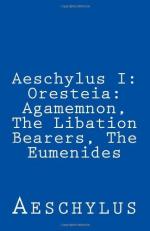|
This section contains 6,440 words (approx. 22 pages at 300 words per page) |

|
SOURCE: "The Pattern of Aeschylean Tragedy," in Transactions and Proceedings of the American Philological Association, Vol. 101, 1970, pp. 77-94.
In the following essay, Caldwell discerns an "oedipal pattern" operating in all of Aeschylus' plays. The "effect of a father upon his children," he claims, is "the most important single element in the total work of Aeschylus."
A major obstacle in the way of an inclusive, unified appreciation and criticism of the work of Aeschylus has been the tendency to study the plays (or trilogies) as discrete entities, related to the other plays only by distance and contrast. Thus the Persae, Septem, Supplices, Oresteia, and Prometheus have all been regarded, at different times and by different critics, as anomalies in the history of Greek tragedy, as virtually separate genres.
To be sure, wide-ranging diversity is exhibited in the Aeschylean corpus, one of several ways in which the work of Aeschylus...
|
This section contains 6,440 words (approx. 22 pages at 300 words per page) |

|


